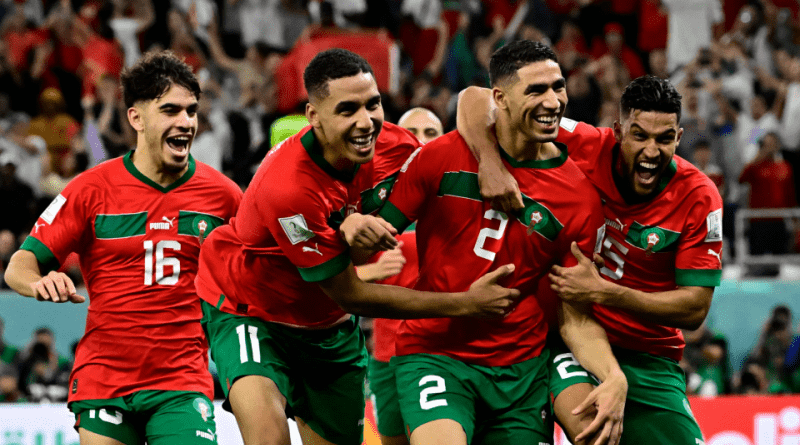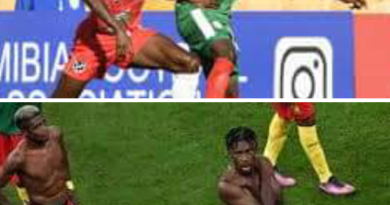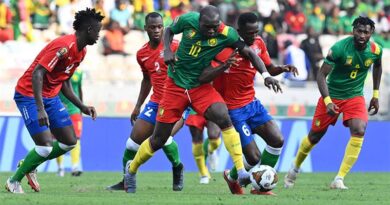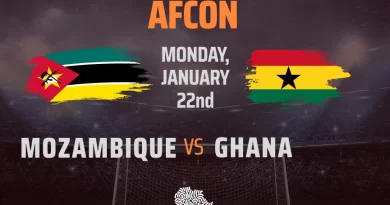Binewa Team Profile: Morocco at TotalEnergies AFCON 2023
By Mwambo E. Lyonga

Morocco officially known as the Kingdom of Morocco is a country in the Maghreb region of North Africa. It overlooks the Mediterranean Sea to the north and the Atlantic Ocean to the west, and has land borders with Algeria to the east, and the disputed territory of Western Sahara to the south.
Morocco also claims the Spanish exclaves of Ceuta, Melilla and Peñón de Vélez de la Gomera, and several small Spanish-controlled islands off its coast. It spans an area of 446,550 km2 with a population of roughly 37 million Citizens.
Its official and predominant religion is Islam, and the official languages are Arabic and Berber (Tamazight); French and the Moroccan dialect of Arabic are also widely spoken. Moroccan identity and culture is a mix of Arab, Berber, African and European cultures. Its capital is Rabat, while its largest city is Casablanca. The 1976 Africa Cup of Nations winners will be making their 20th appearance in the tournament after making their debut in 1972 in Cameroon.
They have also participated in seven FIFA World Cups and remain the only African country to reach the semifinals after doing so in the 2022 FIFA World Cup in Qatar.
Team Bio
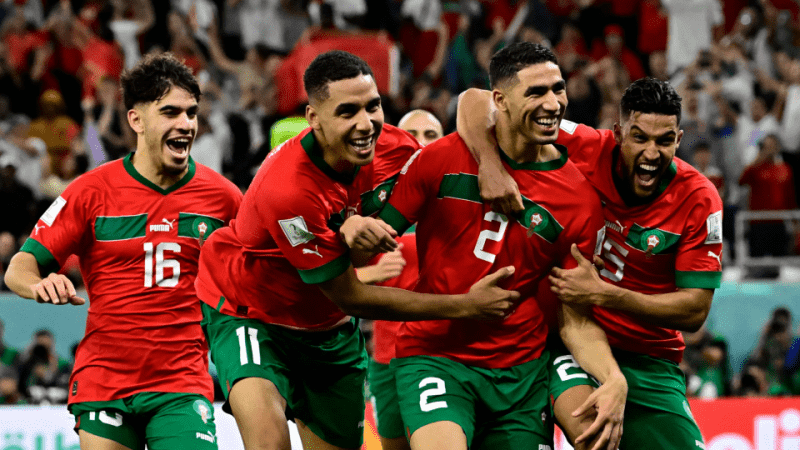
Morocco played their first and last Africa Cup of Nations tournaments in Cameroon. In their debut in 1972, the Atlas Lions were drawn in Group B with eventual winners Congo Brazzaville, Zaire and Sudan. Similar 1-1 draws with all their group stage opponents saw them finish third in the group and failed to make it to the knockout stage at the first time of asking. The failed to qualify for the next tournament in Egypt but fired from all cylinders in the next tournament in Ethiopia, winning their only trophy till date.
After a 2-2 draw in their first game Sudan, they registered their first ever AFCON win against Zaire with 1-0 win and followed that up with a resounding 3-1 win over the Super Eagles of Nigeria to finish top of Group B.
In a tournament that was played in an unusual format the two top teams from the two groups had to play a final round with the team with the most points crowned champions. Morocco, Nigeria, Guinea and Egypt qualified for the final round. Morocco proved to be too strong for the rest with 2-1 wins over Egypt and Nigeria and a 1-1 draw with Guinea. They won their only AFCON title till date. Striker Ahmad Faras became a national hero as his three goals helped them to unprecedented success.
In 1978 in Ghana, they were knocked out at the Groups stage as Uganda and Tunisia finished ahead of them in Group B with Congo Brazzaville tailing the group.
They worked their way back to the podium in 1980 when Nigeria hosted and lifted the tournament. After a 1-1 draw with Guinea and a loss to Algeria in their second game they secured a place in the knockout stage with a 1-0 win against Ghana thanks to Khalid Labied’s 44th minute goal. In front of 70,000 belligerent home supporters, Felix Owolabi gave Nigeria the win with a ninth minute goal.
In the third place game, Khalid Labied again deed the needful with a brace against Egypt to give them a 2-0 win. Labied finished as joint top scorer with three goals alongside Nigeria’s Segun Odegbami.
They failed to qualify for next two tournaments. When neighbors Egypt hosted in 1986, Morocco were drawn in Group B with Cameroon, Algeria and Zambia. Draws against Cameroon and Algeria put their aspirations for a place in the knockout stage in jeopardy, but an own-goal from Zambia’s Jones Chilengi helped them through as group runners-up after a 1-0 win in their final group game. In the knockout stage, they lost 1-0 to hosts and eventual winners Egypt in front of 95,000 spectators at the Cairo International Stadium. Côte d’Ivoire made sure of the Bronze medal in the third place classification game with a 3-2 win over the Atlas Lions.
Morocco hosted the tournament for the first time in 1988 and were hoping to follow in the footsteps of Egypt who hosted and lifted the trophy in 1986. Drawn in Group A with Algeria, Côte d’Ivoire and Zaire, they dominated the Group with a total of five points after draws against Zaire and Côte d’Ivoire and a narrow 1-0 win over Algeria. In the semifinals, they had to solve the equation of the 1986 runners-up Cameroon. At the Stade Mohammed V, in front 45,000 supporters, Cyrille Makanaky’s 78th minute goal was all Cameroon needed to silence the home crowd. The Atlas Lions failed to show nerves of steel in the third place game, as they lost to Algeria in post match penalties after the game ended 1–1 in regular and extra time. For the second consecutive time they had to settle for a fourth place finish.
They failed to qualify for the tournament in Algeria in 1990 and took the exit door at the groups stage in Senegal in 1992.
In 1992, the format of the tournament was reviewed as the number of participants was increased to 12 and drawn in four groups of three teams each. Morocco were in Group B with Cameroon and Zaire. A 1-0 loss to Cameroon and a 1-1 draw with Zaire saw them finish bottom of the group with just one point.
They failed to qualify for the 1994 and 1996 tournaments and only returned in 1998 in Burkina Faso.
In 1996 in South Africa the number of participating teams was increased to 16 but defending champions Nigeria failed to honour the call. Therefore only 15 teams took part in the tournament. Burkina Faso hosted the first 16 teams tournament. Morocco topped Group D ahead of Egypt, Zambia and Mozambique. They eliminated at the quarterfinals by South Africa after a 1-2 defeat.
In 2000 and 2002, they failed to make it past the group stages but bounced back in style in 2004 in Tunisia.
Wins against Nigeria(1-0) and Benin(4-0) and a draw against South Africa saw them finish top of Group D with seven points. A North African derby was on the menu at the quarterfinals. Algeria were no pushovers but Morocco made sure. A 3-1 win after extra time saw them qualify for the semifinals. In the last four, Youssouf Hadji and his teammates made light work of Mali and qualified for the final only for the second time.
Tunisia had muscled their way to the final and were determined to make the most of their home advantage. Morocco in quest of a second title threw in all in the tank, but Youssef Mokhtari’s goal turned out to be a mere consolation as Tunisia became African champions for the first time with a 2-1 win. For the third and last time Morocco were on the AFCON podium.
In 2006 and 2008 they were eliminated at the groups stage and failed to qualify for the 2010 tournament in Angola. Their return in 2012 and 2013 was equally disappointing as they were eliminated in both tournaments at the groups stage.
In 2015 they declined hosting the tournament for health reasons and were disqualified by the Confederation of African Football.
They returned in 2017 in Gabon and for the first time in 13 years, they made it out of groups stage.
After losing their opening game against the DR Congo, they lined up two wins against Togo(3-1) and Côte d’Ivoire (1-0) and finished second in Group C behind the DR Congo. In the quarterfinals Egypt had the final word thanks to a goal from Mahmoud Abdel Moneim Abdel Hamid Soliman in the quarterfinals.
In 2019 in Egypt, the AFCON saw another revolution as it was enlarged to 24 teams. Morocco was one of the pre tournament favorites on paper. They did not disappoint in the groups stage with a clean sweep in Group D. Wins against Namibia, Côte d’Ivoire and South Africa with identical 1-0 wins saw them match on to the knockout stages with big ambition. However, they were shocked by a spirited Benin in post match penalties after a 1-1 draw in normal and extra time. Youssef En-Nesyri and Sofiane Boufal missed their spot kicks as Benin prevailed 1-4 in the shootout.
In the 2021 edition in Cameroon, Morocco failed to shine again but made progress. After dominating Group C unbeaten with wins against Ghana(1-0) and Comoros(2-0), they settle for a share of the spoils with Gabon in an intriguing 2-2 draw. They progressed to the knockout stage and were given a run for their money in the round of 16 against Malawi. Hellings Frank Mhango shocked them with an early goal but goals from En-Nesyri and Hakimi made sure Morocco progressed to the quarterfinals.
At the quarterfinals, Egypt put an end to their aspirations for a second AFCON triumph with a 2-1 win after extra time.
Côte d’Ivoire promises to be another glorious chance for Morocco to battle tooth and nails for that elusive second title.
The Journey
Morocco qualified as Group K winners after three wins and one loss. The group initially consisted of four teams: Morocco, South Africa, Zimbabwe and Liberia. However, on 23 May 2022, CAF announced that Zimbabwe were disqualified from the qualifiers due to the continued suspension of the Zimbabwe Football Association by FIFA. The group thus went ahead with only the three remaining teams.
The teams played against each other in a home-and-away round-robin format between June 9, 2022 and October 17, 2023. Morocco and South Africa, the group winners and runners-up respectively, qualified for the 2023 Africa Cup of Nations.
Earlier results
Game day 1
Morocco 2-1 South Africa
Game day 2
Liberia 0-2 Morocco
Game day 3
South Africa 2-1 Morocco
Game day 4
Morocco 3-0 Liberia
Qualifications group
Morocco 9 pts
South Africa 7 pts
Liberia 1 pt
Zimbabwe 0 pt
Players to watch
Youssef En-Nesyri
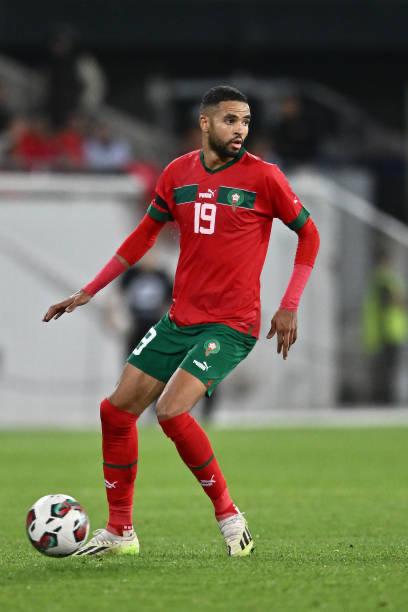
Youssef En-Nesyri is a Morocco international forward who was born on June 1, 1997 in Fez, Morocco and plays for Spanish La Liga club Sevilla. He is known for his aerial game and heading ability.
With two goals to his name in the qualifiers 26-year-old Sevilla forward En-Nesyri will be Morocco’s front man to stop in the 2023 AFCON in Côte d’Ivoire.
En-Nesyri has spent his entire senior footballing career in Spain, representing Málaga, Leganés and Sevilla. He has made over 150 La Liga appearances and scored over 50 goals.
En-Nesyri made his international debut in 2016 aged 18, after previously being capped by the nation’s youth teams at under-20 level. He was chosen in Morocco’s squads for the FIFA World Cup in 2018 and 2022. He was also picked for the Africa Cup of Nations in 2017, 2019 and 2021. His experience will be vital for them.
Ayoub El Kaabi
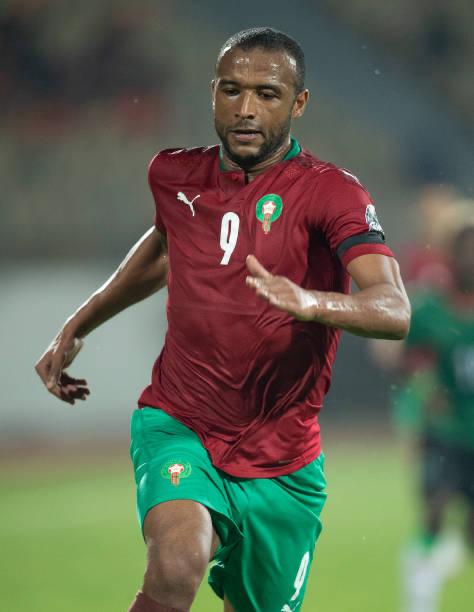
Ayoub El Kaabi is a Moroccan international forward who born on June 25, 1993 in Casablanca, Morocco and plays for Greek Super League giants Olympiacos. He started his professional career playing for Racing de Casablanca.
A full international for Morocco since 2018, El Kaabi has represented his country at the 2018 FIFA World Cup in Russia, one Africa Cup of Nations tournament and two African Nations Championship tournaments.
El Kaabi was the top goalscorer of the 2018 African Nations Championship, taking place on home soil, with nine goals. This made him the first player to score as many goals in a single edition of the tournament, having surpassed the previous record set by Zambia’s Given Singuluma of five goals in 2009. After bagging a brace in the semi-final against Libya, Morocco made it to the final of the competition for the first time in history, where they won their first title after a big 4–0 win against Nigeria. El Kaabi scored two goals for Morocco in the qualifiers and will be without any doubts a potent goal threat in Côte d’Ivoire.
Amine Harit
Amine Harit was born June 18, 1997 in Pontoise, France and plays as an attacking midfielder for French Ligue 1 club Marseille. Born in Pontoise to Moroccan parents, Harit acquired French nationality on 27 August 2003, through the collective effect of his parents’ naturalization. He came through the ranks of FC Nantes before breaking into their first team in 2016-2017 season and made 30 league appearances before joining Schalke 04 in Germany. With over 100 league games for Schalke 04 he returned to France and joined Marseille first on loan before making the move permanent in 2023.
Harit played for the French national youth teams starting from the France U18s up to the France U21s. He refused a call up to the Morocco U19s in October 2015. He even went to play for France again. However, on 12 September 2017, Harit decided to switch his allegiance to the Morocco national team. On October 7, 2017, he made hs international debut for Morocco in a 2018 FIFA World Cup qualification match against Gabon at the Stade Mohammed V in Casablanca, replacing Nordin Amrabat in the 90th minute of the 3–0 win. In May 2018, he was named in Morocco’s 23-man squad for the 2018 FIFA World Cup in Russia. On November 10. 2022, he was named in Morocco’s 26-man squad for the 2022 FIFA World Cup in Qatar though he sustained a knee injury which ruled him out of the World Cup.
Harit scored his first goal for the national team in a 3–0 victory against Liberia on October 17, 2023, his only goal in the qualifiers.
Achraf Hakimi
PSG full-back Achraf Hakimi is arguably one of the best right backs on the world stage, and he has taken part in the last 3 AFCON tournaments from 2019. Hakimi brings a lot offensive to the Atlas Lions, highlighted by his 8 goals in 64 appearances. Watch out for the 25-year-old’s sharp crosses down the right.
Sofyan Amrabat
Sofyan Amrabat brings about a certain bounce in Morocco’s midfeild. The Manchester United star wears his heart on his sleeves and it is shown with every tackle and engagement in Regragui’s team. Amrabat anchors the midfeild and makes breaking play an art.
Azzedine Ounahi
Midfeilder, Azzedine Ounahi was a revelation in Morocco’s 2022 World cup scalp, which eventually landed him a deal from Angers to French giants, Marseille. Ounahi thrives when given space, and he is most effective as a box-to-box midfeilder. The 23 year old has played 11 games in the Ligue 1 for 2 goals scored this season. Ounahi brings in a certain balance in the middle of the park
Yassine Bonou
Every solid team starts from its keeper, and Morocco have Yassine Bonou manning the goal line. The 2023 CAF goalkeeper of the year made a name for himself at Spanish side Seville between 2019-2021 with two UEFA Europa league medals, before moving to Saudi. Bonou his known for his good reflexes and penalty saving abilities.
Abde Ezzalzouli
La Massia graduate, Abde Ezzalzouli has steadily progressed over the last couple of months for club and country. The Real Betis winger won AFCON U23 as skipper for the Morocco team last year, and went on to put together good performances for Real Betis (5 goals in 24 appearances) in all competitions.
Coach
Walid Regragui
48-year-old Walid Regragui is the man to carry Morocco’s aspirations for a second AFCON triumph in Côte d’Ivoire. The former Moroccan international defender who played notably for Toulouse and Ajaccio was part of the Moroccan team that finished as runners-up in the 2004 tournament in Tunisia. He made history when he led the team to the semi-finals of the FIFA World Cup 2022, the first and only African nation to achieve that feat.
Winner of multiple league titles and the CAF Champions League with Wydad of Casablanca, the former FUS Rabat and Al Duhail coach has what it takes to unlock what many consider as Morocco’s unfulfilled potentials in Africa’s greatest football showpiece.
2023 AFCON matches Group F
Morocco will kick-start its campaign against Tanzania on January 17, and play against DR Congo on the 21st and Zambia 24th of January respectively.

